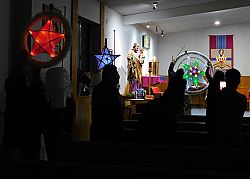Traditional Filipino Christmas novena under way

AMERICAN FORK — The traditional Filipino Christmas novena of Masses known as the Simbang Gabi began in the Diocese of Salt Lake City on Dec. 15 at the Cathedral of the Madeleine. From then until Dec. 25, each day a different parish in the diocese will host the Mass.
On Dec. 17, it was the turn of St. Peter Parish in American Fork. Despite the fact that the parish community is comprised primarily of Anglos and Hispanics, for the celebration members of the Misang Bayan, the Filipino Catholic community, came to the church from all over the state.
Gina Lipon, a parishioner of St. Francis of Assisi in Orem and a member of the Misang Bayan community, arrived at the celebration with her husband and son, who are part of the Filipino choir.
“Every time that we celebrate this [Simbang Gabi] it means so much for us,” she said explaining how the tradition makes her feel like she is back in the Philippines.
“It makes me feel at home. ... We miss the Philippines and our family that is there, especially in this season, but celebrating together as a community of faith makes me happy,” she said.
Every year the diocesan Simbang Gabi has a theme. This year it is Kagalakan, Pagmamahal at Kapayapaan, which means joy, love and peace.
The night Mass, which is one of the oldest and dearest traditions that the Filipinos celebrate, was framed by colorful “parols,” or traditional lanterns.
The popular symbol of Christmas among Filipinos consists of a handmade lantern made of wooden sticks and colored paper. This year the Misang Bayan community made the parols in November at St. Ambrose Parish.
The parol is made as a five-pointed star that is symbolic of the star that appeared in Bethlehem when Jesus Christ was born. The word “parol” comes from the Spanish word “farol,”meaning lantern.
“It also reminisces the lanterns used by the farmers and fishermen to light their way to attend the Misa de Gallo (Simbang Gabi) which is celebrated around 4 in the morning.” states the program of the celebration.
In the Diocese of Salt Lake City, due to the winter weather in December, the Masses are celebrated at a different time, but the practice and essence of the tradition remain the same.
At the beginning of the Mass people process into the church carrying the parols, which light the way because the lights of the church are dimmed.
One by one the parols are set beside the pews.
At the celebration at St. Peter Catholic Church, the celebrant was Father Joshua Santos, parochial vicar of Saint Ambrose Parish.
During the Mass, symbolic gifts were presented at the offertory. Among them were fruits such as green and yellow mangoes, bananas and papayas, typical fruits of the Philippines that represent the labor and efforts of the common people. Other gifts were rice, which represents part of the daily meal in the country; brown sugar, which is added to Filipino sweets and drinks; vegetables that grow in many parts of the Philippines; and fish and seafood, representing the fishermen and that fact that the sea is a significant source of food in the Philippines. Another gift was the rice cake, a traditional Filipino food.
The Misang Gabi is open to all.
“They really welcome us. ... Last year when we came we loved it, so when we heard it was happening again we didn’t hesitate and came,” said Luis Pizano, a St. Peter’s parishioner.
Pizano doesn’t speak either English or Tagalog, the traditional language of the Philippines, but for God there is no language, he said.
“We all are brothers and sisters; we feel the presence of God,” he said, adding that as a “Catholic community it is important to stay together and participate in our different traditions because we are all one in God. He loves us all.”
After the Mass, those attending were invited to a reception at which traditional Filipino foods were served.
© Copyright 2024 The Diocese of Salt Lake City. All rights reserved.

Stay Connected With Us